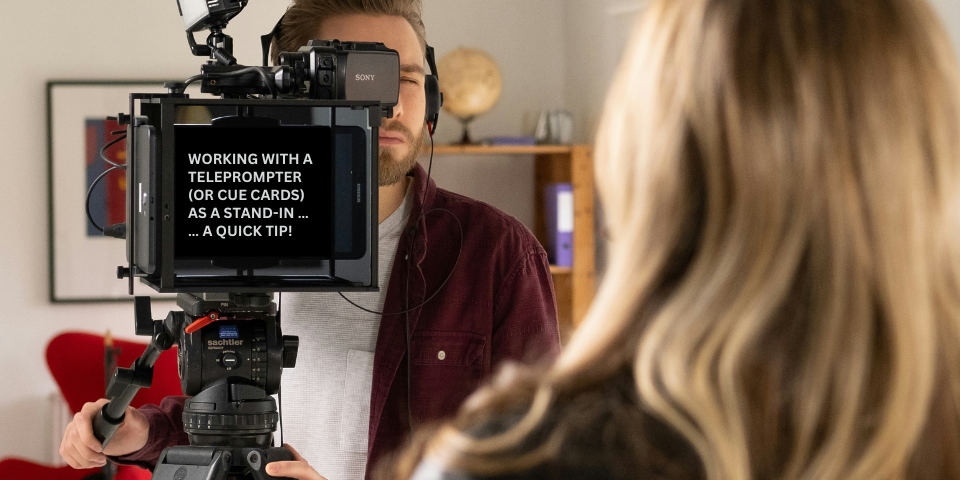For many, standing in sounds like a very easy job. However, I’ve held a number of stand-in jobs with varying levels of difficulty. Yes, some gigs are very easy. Some are just plain challenging. Others? Bordering on insane.
Here are some strategies I’ve developed in order to do my job well as a stand-in on more difficult, “insane” sets.
The Spectrum of Stand-In Jobs
For some stand-in jobs, you just show up and production calls you in to stand in a place while the shot is set up around you. These are obviously very easy gigs, and if these are the only types of stand-in gigs you ever have, you probably feel as if standing in is a piece of cake.
But for other stand-in jobs, you could be asked, “How high did your actor raise his hand in the rehearsal?” I’ve had these gigs, and in these gigs, I am continually paying attention to the details of what my actor does not only in rehearsal but also probably from take to take. These are obviously the more difficult gigs, and if you’re only accustomed to easy stand-in gigs, these gigs may exhaust you.
Other difficult stand-in jobs may be difficult not so much for the amount of attention to detail required but more so for the amount of extra-sensory perception (ESP) you seem to need. Some productions may not clearly announce actor rehearsals, marking rehearsals, or when second team is needed on set. Stand-ins on these jobs, if not in tune with the movements of the major players on set, may find they’ve missed a rehearsal and have no clue what happened in the scene for which they’re standing in. That’s when ESP seems to come in handy. ESP also comes in handy when trying to interpret the interests of the director, DP, or camera crew, who despite their professional and artistic brilliance may not be the clearest of communicators, leaving you to have to essentially “read their minds” very quickly in order to do what they want.
I should make it clear that I don’t believe in mind-reading or ESP. This is to say, these stand-in gigs are so challenging that they’re more of the “insane” variety.
Also of the “insane” variety are those stand-in jobs wherein you have to deal with unpredictable, unprofessional outbursts from superiors — a “yeller” — when you don’t read their minds to perform to their exacting specifications. The “punishment” on these kinds of stand-in jobs may be that you’ll get yelled at and feel humiliated for your inability to perform your job to their precise needs.
Few people enjoy working on a set with lots of yelling and professional condescension, so insofar as you’re interested in keeping your stand-in job on one of these “insane” productions, it behooves you to develop strategies for success as not to evoke wrath and deprecation.
Dealing with The Yeller
One day you might show up on set and find someone’s a yeller. This yeller may be the director or the 1st AD or even the 2nd 2nd AD. Or it might be the DP. Whatever the case, the yeller is someone above you in a position to make you feel horrible if you’re not performing your job by yelling at you in front of the crew when you make a perceived mistake.
If you are a stand-in who does her job well, being yelled at may not be something you are accustomed to. In fact, it may not even be warranted; you may have done your job exactly as you should have and still gotten yelled at. The emotional consequences of being yelled at can be a bad mood, a lowered self-esteem, tears, and at the extreme end depression. These results can then start to interfere with your job and make your belittling almost a self-fulfilling prophecy if they bother you for long enough and you aren’t able to recover quickly.
One great strategy I’ve found for dealing with the yeller and preserving your sanity when you are doing your stand-in job to the best of your ability is to refuse to feel bad about yourself. When you refuse to feel bad about yourself, when someone on set puts you or your work down, you essentially fundamentally disagree with their negative sentiment and direction. Something as harsh as “Weren’t you watching the [expletive] rehearsal?!” won’t affect you if you refuse to feel bad about yourself; furthermore, it will clarify for you that the yeller is trying to make you feel bad and that that’s the truly deplorable behavior, not your stand-in work. In refusing to feel bad about yourself, you see that the person with the issue is the yeller, not you, and the problem is the yeller’s, not yours.
Another great strategy in dealing with the yeller is to not take the criticism personally. This is similar to refusing to feel bad about yourself in that the advice takes your mind off yourself when you hear the criticism and instead places your focus on the yeller. That is, the problem is not you but instead the yeller and the yeller’s own inabilities to cope with the current situation. The yeller lashes out at others as a way of coping. That you are the target of the yelling is more of an accident than anything else — it’s impersonal. This is especially true when you do your job as a stand-in very well and are not really making mistakes.
Dealing with The Mystery Production
The mystery production is that set you’re standing in on where actor rehearsals and/or marking rehearsals are not clearly announced and that anything important is going on may be a complete mystery to you if you’re not in the know.
Couple the yeller with the mystery production and as a stand-in you are working in a situation where you will find it is very easy to get yelled at unless you aggressively seek information to become more in the know.
One mystery production I worked on took me a while to figure out a strategy for success. I noticed after a couple days into the stand-in job that the director would sometimes rehearse with actors without really informing the rest of the crew — AD and camera department included. I remember setting up a shot in a doorway with the camera department, only to have the director yell at me for standing on the wrong side of the archway and in the doorway rather than a step behind it. Neither the camera crew nor I had realized the director had held a rehearsal with the actor. It was then I realized I may have to track this director more closely in case he was holding a mystery rehearsal.
Sure enough, I started having more success in my stand-in job when I tracked the director. On most sets, there is a private rehearsal clearly announced to the crew wherein stand-ins do not watch, then there is a marking rehearsal announced to the crew wherein stand-ins do watch. On this production I worked, however, few rehearsals were ever clearly announced meaning that a rehearsal could be going on without my knowing. My only real knowledge of a rehearsal would come from watching where the director was and trying to figure out what he was working out with my actor.
This meant that I depended less on the AD department to announce when second team was needed and instead I aggressively pursued blocking information for my actor on my own. When rehearsals were announced and the AD department asked the crew to back away, rather than back far away I would get as close to the rehearsal as I could without imposing so that I could glean as much information about the scene and its blocking as possible. Why? Because the director of this mystery production was also a yeller, and I did not want to face the humiliation of not knowing what was going on.
In Conclusion
These two types of challenging stand-in gigs — with an on-set yeller and on a mystery production — are only two examples of “insane” stand-in gigs. Each challenging stand-in gig you find yourself on may demand you innovate methods for success in doing your job.
Overall, I imagine it helps as a stand-in on a challenging production to be more proactive than passive, seeking information rather than letting it be told to you. That is, as a stand-in, lead yourself rather than be a follower.
What types of “insane” stand-in gigs have you had and how did you figure out strategies for dealing with them? Did you find the above advice helpful for dealing with an “insane” situation? If so, share below!






I too have encountered both the “yeller” and the “mystery set” throughout my stand-in career. I agree with your advice. I was more affected emotionally by these “insane” gigs toward the beginning of my career. But as I gained more stand-in experience, I grew more confident in my abilities. No matter what happens on set, at the end of the day I know that I am an experienced stand in and I know I am doing the job to the best of my ability. It helps me tell myself this to remind myself of my professionalism after an especially challenging day on set.